#inclusive orthodoxy
Explore tagged Tumblr posts
Text
#orthodox christianity#orthodoxy#orthodoxleftist#social justice#socialism#christian socialism#queer christian#inclusive orthodoxy#faithfullylgbtq#trans christian
9 notes
·
View notes
Text
Inquiring Into Orthodoxy
On first services, what to expect, and good etiquette.
A few times now I've found myself writing preposterously long messages about the very beginnings of being an inquirer into Orthodox Christianity. I'm passionate about helping those with such disorders as social anxiety or autism feel more confident attending their first service and, potentially, laying the foundations for catechism, so I am writing this in the hope that I can direct people to this post, instead of preparing my poor arthritic fingers for a 2000 word message.
Glossary at the bottom of the post.
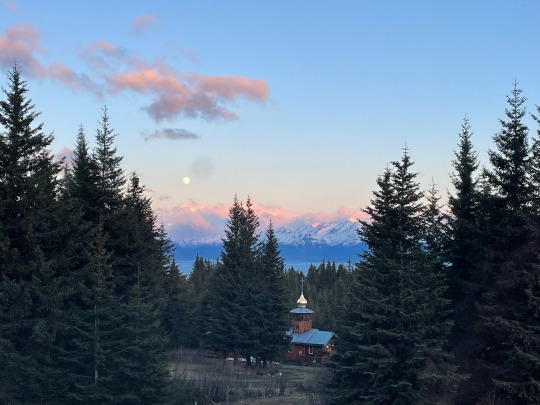
My 'credentials':
I went through the process of inquiry, catechism and baptism/chrismation as an adult in a foreign country. I suffer from various physical and psychological disabilities that give me social anxiety and make me sensitive to novelty and change. Still, I did it and enjoyed it!
Admittedly, my catechism was much shorter than most, as I ended up being baptized in a sort of emergency situation. I will not speak much on catechism for that reason on my blog, and this post will focus on inquiry and your first few services.
So, orthodoxy has piqued your interest!
Finding Orthodoxy and developing an interest in it is exciting, but as quickly as the excitement came, can it go, when you discover that unlike protestant denominations, it is hard to dive head-first into. Theoretical and historical knowledge abounds, but the practice is community based, initiatory and generally not open to 'outsiders'. Figuring out how to dip your toes in can seem daunting, as most resources are geared toward people already actively looking to convert. And perhaps even more importantly, the (seemingly) grave and deeply mystical tradition feels unapproachable. Hopefully the following information will help you find direction and feel more comfortable in how you proceed!
The very humble beginnings
Step one, for one's own benefit, should be a little homework. Assuming you haven't yet, it's good to read up on things like:
The norms and values of Orthodoxy;
How Orthodoxy differs from your (former) religion;
The history and cultural role of Orthodoxy;
The primary denominations within Orthodoxy.
This will orient you slightly in your process of familiarizing yourself. For example, if the Orthodoxy that sparked your interest was Russian Orthodoxy, you don't want to accidentally attend a Coptic church - you won't know what hit you. It will also allow you to start deciding whether Orthodoxy really is for you, and see how it and its values match up with your lifestyle and ideals.
When you've learned about the concept of Orthodoxy, the next step is to look around for a church near you. To become Orthodox, you rely on a parish and a priest - being an ancient religion it is inseparable from community. Don't focus too much on what kind of church you go to for your first few services. It's of little consequence in the long run, as long as it falls in the broad category of the Orthodoxy you're wanting to convert to. The difference between Greek, Russian and Antiochian, which are all Eastern Orthodoxy, is fairly minimal compared to the difference between Russian and Coptic or Ethiopian and Syriac!
Your first Services
There is some merit in choosing your very first service wisely. They have different meanings, lengths, activities and levels of laity participation. I will take the different Eastern Orthodox services as an example list here, because it is the most accessible form of Orthodoxy in the USA and Europe, but you can research the services of the other big denominations as well if you are attending those churches, to decide which one you should go to first.
Common Types of Eastern Orthodox Church Services:
Matins/Orthros: A morning service of about an hour to an hour and a half, dedicated to glorifying the triune God. Traditionally held before dawn and glorifying the light of Christ, it is now held at various times during the day and often serves to lead up to liturgy. Normally held only on sunday and feast days in parishes, but held every day in monasteries.
Vespers: Evening service traditionally held at sunset, preparing the laity for the evening and glorifying the providence of God. Most parishes hold vespers on wednesdays, fridays, and saturdays.
Liturgy: The primary worship service on Sunday. Normally held in the morning, it is the most important service to most Orthodox Christians.
Note that despite this incredibly simplified breakdown, Orthodox worship is very complicated. There are many many services that are held daily in monasteries, that are grouped together into clusters that can be held daily or a few times a week. Service times also differ across jurisdictions and parishes, and the entire worship structure changes throughout the year!
Thankfully, you will not have to spend hours reading liturgical history to figure out how and when to attend. Most churches will have a website with a schedule!
So how do I know which service to attend? Depends! For most inquirers, liturgy is the most popular choice. It is generally attended by the most people, and gives you a taste of everything all the other services have. Sacraments, glorification, hymns, entrances, everything! However, if you are looking for a quieter and more accessible service to attend, vespers can be a great choice. There are no sacraments, just glorification and litanies!
Preparing for the service, and LGBTQ+ problems
If you want to make a good impression, it will be worthwhile to consider things like what you wear, and what you'd like to learn. Let's talk about what to wear, because it can be a sensitive matter to decide what to wear. The Orthodox church is fairly heavily gendered, and there aren't many churches geared toward LGBTQ+ people. To keep things simple and welcoming, I will not use the strongly gendered language the Orthodox church might, as despite my activity within the church, I am queer myself and care about my LGBT siblings. Henceforth we will speak of feminine- and masculine-presenting people! How you interpret that is up to you: you can pick one to stick with, or pick a new one every day. Or even find a happy medium!
When choosing what to wear, it is important to realize two things. One: that you are not Orthodox yet, and therefore not expected to live up to any standards. Two: that Orthodoxy is not about following a set of laws or meeting a standard set by, for example, clergy or fellows, but rather about doing what brings you closest to God, to the best of your ability. Once you are Orthodox you may run into people who expect you to adhere to certain prayer rules, fasting habits or clothing standards like they're laws, but that is an innately unorthodox way of acting. When one is sick or overworked they are not blamed for not attending church, when fasting actively takes away your wellbeing you are not blamed for not doing so. In much the same way, if dressing a certain way makes you unhappy, you are not obliged to do so. There is, however, etiquette, and then the entirely separate matter of tradition.
Proper attire.
For the sake of not being rude, it is preferable that attendees, Orthodox or not, dress modestly and presentably. It is meet to be clean when you arrive, and to ensure your shoulders, knees, and stomach are covered. You don't have to dress formally, just dress as you would to meet acquaintances. You may want to consider wearing shoes that aren't too hard to put on and take off, as some churches will prefer you to take your shoes off! Socks are also pretty handy, in that sense. Tile floors are cold.
Traditional attire.
As you aren't yet Orthodox in any capacity, this is not required for you to adhere to in any way. For your second or third service, however, you may feel a need to fit in, and that's where traditional attire comes in. For feminine-presenting people, it is common to wear skirts or dresses (over the knee) rather than pants. Pants are permitted however, but 'informal' pants such as denim, shorts, etc, are discouraged. Opt for dressy pants!A head covering is also common, symbolic or not. Depending on what kind of church you go to, you may see anything from a small crocheted circle to a full scarf. Head coverings are not required! The standard for modesty means it is preferred that attendees do not wear overly tight clothing, overly flashy clothing, ostentatious jewelry, etc cetera.
Masculine presenting people are expected to be clean and modest as well. So the same rules apply: opt for humble, slightly formal wear. Make sure shoulders, knees and torsos are covered, and your clothing isn't meant to make a statement.
Standards for what is 'formal' can differ region to region. Here in Alaska, nice clean jeans are considered very much formal, maybe even exceptional (I don't even own a pair of unstained jeans). A nice sweater and clean jeans is perfectly acceptable here, but may be considered insufficient somewhere else. At the same time, because of the amount of Russian influence in Alaska, a full head covering is considered much more important than it may be in other places. Keep that variability in mind when you decide what to wear!
Attending the service
There are many questions about attending a service. When do I arrive? Who do I greet? Can I bring anyone? Where do I sit/stand? What are good manners? When do I cross myself? Can I participate? Who will talk to me? What can I expect? Let's take these one by one.
When do I arrive?
The short answer is: on time. Most people will enter the church a few minutes before the service starts, but you may notice people keep streaming in as the service goes on. As an inquirer, nobody will judge you for arriving at variable times or being uncertain of when to come. It would be best for you to arrive a minute or two early, or right as the service starts - but nobody minds you coming in a few minutes late.
Who do I greet?
If you're arriving shortly before the service, you can greet whoever you want. People will probably say hi and good day to you, and may even make small talk. This is a great opportunity to ask where to sit or stand, and anything else you may want to know. If you're walking in as the service is already happening, save for the people singing, everybody will be quiet. You should be too! Don't go chatting people up, but you may get whispered hellos and instruction.
There is also the matter of greeting icons! Orthodox churches are usually divided into a few sections. Here is an example of a Russian Orthodox church:
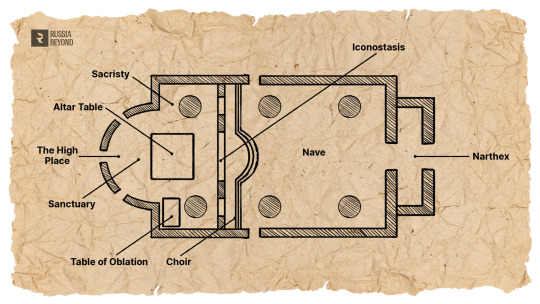
Note the 'narthex', the room in which you enter! In the narthex there is commonly an icon of Christ to the right of the entrance to the nave (the church proper), and the Theotokos to the left of it. These icons are normally greeted by the assembled faithful, as it is their house, and it is polite to greet your host! Reflecting this, most Orthodox people will perform the following, first before Christ, then before the Theotokos: they cross themselves twice or perform two metanoias, kiss the icon or bow to it, and then cross themselves or perform a metanoia once more. Usually the kissing is on the bottom of the icon, because kissing the feet of your host was good manners in Christ's day. You may greet and venerate these icons too! You can perform the full metanoias, or you can simply bow or kiss your right hand and press it to the icons. The latter are much less daunting, and just as respectable! NOTE: do not kiss icons when you are wearing lip balm or lip makeup! This can damage the icons, which are usually very expensive and handmade.
Can I bring anyone?
Yes! You may bring anyone you like, including children. Adults should adhere to the same manners you do to the best of their abilities, of course, but anybody is welcome. Children are expected to be kept in check, but they are certainly not shunned. Just make sure that if you have small children that cry, you step into the narthex or step outside for a moment until they are quiet again, so as to not disturb the other faithful.
Where do I sit or stand?
If your church has seating it will most likely be along the walls of the church, so sit there! If there is no common seating, which is not unusual, stand in the back, where you can still see well! Where you want to stand may differ a bit parish to parish, so feel it out! Just don't stand in the way of others. For example, if you're not singing, don't stand next to the sheet music. If you are disabled and can't stand, but there's no benches, look around. There may be one or a few chairs in the back of the church for the elderly and disabled. If there aren't any, consider requesting it of the priest after the service ends.
What are good manners?
I think I will divide this section into two parts: 'etiquette', the things you really ought to do, that are polite and respectful and the bare minimum, and 'brownie points'; things that are not necessary at all, but very impressive, considerate and cool!
Etiquette:
Do not disturb others. Turn your phone on silent, do not accept calls in the church, don't talk out loud in the nave during the service, and if you are spoken to or asking somebody a question (which is okay!), speak quietly. Please step outside with crying children, et cetera.
Be polite. Be nice to the other faithful, don't cuss, don't start arguments or debates in the church, don't ask invasive personal questions, handle the possessions of the church with care.
Do not eat or drink in the church unless it's consumables that were handed to you during the service.
Be patient. Orthodoxy is ritualistic and mystical, and sometimes that gets in the way of things happening quickly or practically.
Try to accept things that are given to you. People may hand you blessed bread or similar items. If you for some reason cannot consume what is handed to you, kindly and gratefully decline. If you do receive/accept it, be sure to consume it while inside of the church. Bringing blessed bread outside of the church is very rude!
Stick to the back of the church. In the above picture of a church layout, you can see a wall titled the iconostasis, in front of which are steps on which the choir may be placed. Those steps are called the solea, and as a visitor and inquirer you should under no circumstance step on or past them!
Be reverent. Understand that to the people around you, the place you are in is utterly sacred and the very house of God. Let your actions reflect that you know this, by showing interest, respect, and appreciation.
Brownie Points:
Cross yourself when you enter the nave and at other appropriate moments (as described below).
Stand for the Gospel and the Nicene Creed. The Gospel is announced before it starts, and the Nicene Creed, when in English, starts with: "I believe in one God, the Father Almighty..."
If you arrive late, do not enter the nave or sit down if the priest is not in the sanctuary (e.g. he is instead on the solea, or walking through the church).
Incline your head to the priest when he is walking past you or censing in your direction.
Don't cross your legs or arms, and stand up straight when you are standing.
When and how do I cross myself?
The how-to is simple, but different than you may be used to. Bring together the thumb, index and middle finger of your right hand, as though you're grabbing a pinch of salt.
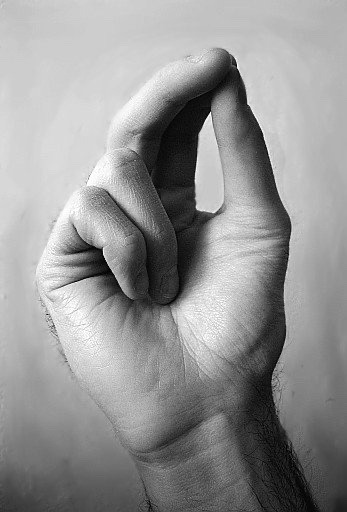
This represents the trinity, and the posture of your fingers is a prayer of itself! Bring your hand to your forehead, then your abdomen, then your right shoulder, and finally your left shoulder. If you want, you can bring it to the middle of your chest after the left shoulder, but it's not necessary.
You cross yourself upon entering the nave, upon exiting it, and every time the trinity is mentioned. That's the universal minimum of sorts. Everything else depends on the parish you're in. So do what others are doing! Cross yourself when you see others collectively doing it, and look for the patterns in when they do so. You'll have it down in no time!
Can I participate?
Yes you can!! But not in everything. As a visitor, you are welcome to participate in pretty much everything but the sacraments. If others are singing or praying, you can sing and pray along, for example. In fact, many parishes will have booklets with explanations, sheet music and text for you to be able to follow along and learn. You are also welcome to receive blessings from the priest during the service, and kiss the gospel book. You can wait for a line to form when these things happen, and witness how others do it. If you feel confident, go ahead and join the line! You can also prostrate, bow, and perform metanoias when others do so, and touch the robes of the priest if he makes the great entrance. Follow along with the others if you feel like it, but it is also perfectly okay to stand in the back and simply witness.
Who will talk to me?
Upon entering, you may be greeted and guided by some of the laity, whether they are just assembled faithful, or clergy/monastics. After the service ends, there are normally announcements by the priest, and this is when he may notice you and encourage you to introduce yourself! After the announcements the priest normally comes up to you to chat a little.
Engaging with a priest appropriately.
When a priest approaches you there are some manners to adhere to. You should address the priest with 'Father', not 'sir' or anything else. Example: 'Nice to meet you, Father!' or: 'Father [Name], what time does liturgy start next sunday?'
Greeting him should be done with respect for his role in the church! A 'good morning, father', goes a long way. If the priest stretches out his hand, it is not for you to shake it. He does it so you can kiss the back of his hand, so that he can bless you! Simply take his hand and kiss the back of it. If you want to do it the way the Orthodox do it, you should support your right hand with your left hand, and hold his hand that way, like this:
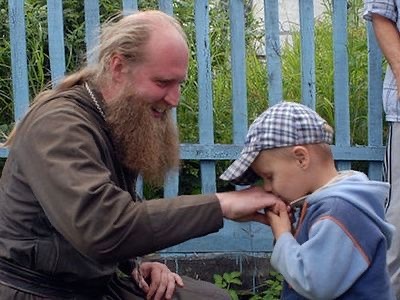
While you are kissing his hand, the priest will make the sign of the cross over your head as a blessing.
Other than that, engage with the priest as you would with anyone else. He's human too!
After the service
On sundays after liturgy, you may be invited to join the parish in a separate building for a shared meal or some sort of coffee hour! This is a great opportunity to meet the laity, ask questions about the service, talk to the priest about further inquiring, and enjoy some fasting-friendly food! However, if that sounds like too much for one day, you will not be blamed if you opt out.
After other services, the laity just goes home and goes about their day.
Attending more services and becoming a formal inquirer
After your first experience, reflect on what you saw and felt! Did you like it? Do you want to try some other churches? Would you like to attend more? All of these options are valid paths to explore.
If you choose to attend more services at the same church, the priest may ask you if you have intentions of becoming a catechumen, a student getting ready to be baptized. You should have an open and honest conversation with the priest, and saying "I'm still thinking about it," is totally okay. In the weeks or months to come you'll likely have many talks with the priest, as he is partially responsible for your life in the church, even if you aren't Orthodox or even a catechumen yet.
As you attend more, it's recommendable to attend more different services as well. Orthros and liturgy, and then perhaps vespers, orthros and liturgy, et cetera. Try on different routines and see how they feel! Also start trying to become a more and more active participant. Learn about the patron saints of your parish, get to know the other faithful, venerate the icons, light candles, sing along, et cetera! It's rewarding and exciting, even if it is also nerve-racking.
Glossary
Baptism and Chrismation:
A service dedicated to joining you to the body of Christ. It washes away your sins, and then anoints you so you may receive the Holy Spirit. It is the first of seven Sacraments.
Blessing:
A blessing is hard to synopsize in a few words, but it is essentially a good wish to you from somebody else, or making you or an item more 'holy'. Read this for a more in-depth examination!
Catechism (cat-uh-kizm):
A period of being a student where you are orally taught about Orthodoxy, in preparation for your baptism and your life in the church.
Censing:
The act of ritually dispersing incense smoke. Usually done with a censer, a special tool for censing.
Church:
Used in many contexts. The church is the collective, organized Orthodox religion. A church is a church building. One can also say 'going to church', which means attending a service. In Orthodoxy, the church is seen as a living organism, of which the lifeblood is the Holy Spirit.
Clergy:
People that have been religiously ordained for special duties within the church.
Denomination:
A recognized, autonomous branch of the Christian Church. Syriac and Coptic Orthodoxy are two different denominations.
Fasting:
The act of abstaining from certain foods to bring yourself closer to God.
Gospel:
The teaching of Christ, and the written record of His life, from the Bible. Read during services from a special holy book, called the Gospel Book.
Holy Spirit:
In Orthodoxy, the Holy Spirit is two concepts that are one thing. One, the Holy Spirit is the lifeblood of the church and the power of prayer and divinity manifest. Two, the Holy Spirit is the third person in the Trinity.
Icon:
A depiction of Christ, the Theotokos, a Saint, or Angel. Never of God Himself! Icons are usually paintings, but they may also be other art forms.
Laity (lay-ih-ty):
Church attendees who are not part of the clergy.
Metanoia (muh-tahn-ya):
A metanoia is a type of prostration. While a prostration involves kneeling and touching one's forehead to the ground, which one cannot do on Sundays, a metanoia can be done at any time, and only involves touching the ground and then crossing yourself.
Monastic:
Somebody who has dedicated their life to Christ. A monk or nun.
Mysticism:
The characteristic of a religion of which the ultimate goal is oneness with the divine.
Parish:
A small church with its own priest that is administratively independent.
Patron Saint:
A Saint that is regarded as the heavenly advocate of a church, place, person, organization, etc. This Saint prays for and on the behalf of the thing it is a patron(ess) of.
Prayer:
The act of prayer. A request for divine intervention or an expression of gratitude directed at God, the divine, a Saint, etc.
Priest:
A religious leader authorized to perform services and pray on behalf of his parish. He is the spiritual leader of his flock and acts as an intermediary between his people and God.
Sacraments:
A sacrament is one of the seven most important spiritual happenings in a person's life. It is a channel for the grace of God to enter a person's life, and a visible symbol of the reality of God.
Saint:
Somebody who has lived an extraordinarily Christ-like life. Usually 'saint' is only in reference to people who have been glorified (formally recognized as a saint), but during services you may also hear acknowledgments of 'unknown saints,' people who lived saintly lives but weren't glorified for it.
Service:
A formal moment of communal worship, normally in a church building and lead by a spiritual leader; but there are also home services.
Theotokos (Thay-oh-TOH-kos):
Lit. God-bearer (Greek), Theotokos is the title commonly used in Orthodoxy for the Virgin Mary, the mother of Jesus Christ.
Trinity:
The Father, Son and Holy Spirit. The collective name for God, Christ, and Holy Spirit and the foundation the church is built on!
-----------------
And that is all for now! This post will be subject to revision for the next few days as I have people look over it, but I hope this serves its purpose for somebody!
#orthodoxy#orthodox christianity#inclusive christianity#catechesis#apothecaric allerlei#christianity
9 notes
·
View notes
Text
Leading Candidates The Next Pope: Who Are The Frontrunners to Succeed Pope Francis?
Source
Luis Antonio Tagle (Philippines)
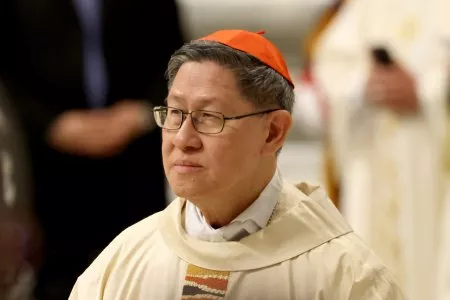
Currently the betting favorite at 3:1 odds, Cardinal Luis Antonio Tagle, 67, is considered a strong contender to continue Pope Francis's progressive agenda.
Tagle, an advocate for inclusion and evangelization, has significant experience leading the Congregation for the Evangelization of Peoples and was a trusted figure in Francis's inner circle.
AN: upon further research he heavily opposes abortion and same sex marriage
Pietro Parolin (Italy)
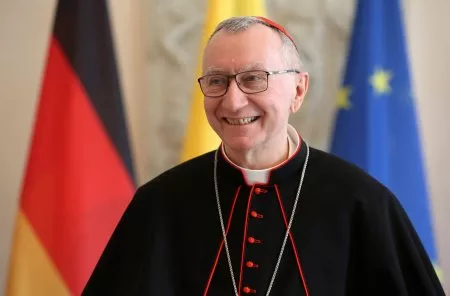
At 4:1 odds, Cardinal Pietro Parolin, 70, is one of the most experienced Vatican officials. In his role as the Vatican's Secretary of State since 2013, he has played a major part in diplomatic affairs, including sensitive negotiations with China and Middle Eastern governments.
Parolin is seen as a moderate theological candidate, someone who could provide stability while still maintaining some of Francis's reforms. His deep ties to Vatican bureaucracy make him a strong contender for those who favor continuity.
Peter Turkson (Ghana)
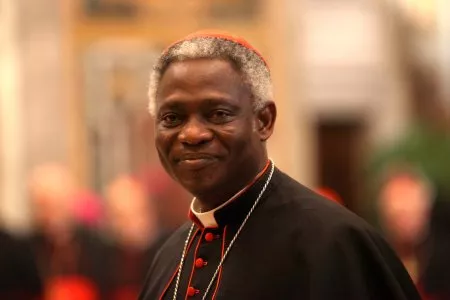
Currently at 5:1 odds in betting markets, Cardinal Peter Turkson, 76, is a well-known figure in the Church's social justice circles. As former head of the Dicastery for Promoting Integral Human Development, Turkson has been vocal on issues such as climate change, poverty and economic justice.
Turkson's election would mark a historic moment as the first African pope in centuries. The most recent African pontiff was Pope Gelasius, who served from 492 to 496 AD. Born in Rome to African parents, Gelasius was known for his extensive theological writings and strong advocacy for charity and justice for the poor.
Peter Erdő (Hungary)
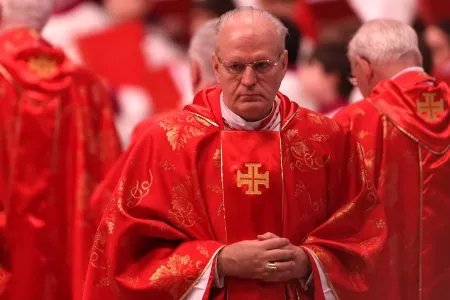
A leading conservative candidate, Cardinal Peter Erdő, 72, is currently at 6:1 odds. A respected canon law scholar, Erdő has been a strong advocate for traditional Catholic teachings and doctrine. He previously served as head of the Council of European Bishops' Conferences and has emphasized theological orthodoxy.
For those seeking a return to the conservatism of John Paul II and Benedict XVI, Erdő would represent a major shift away from Francis's approach.
Angelo Scola (Italy)
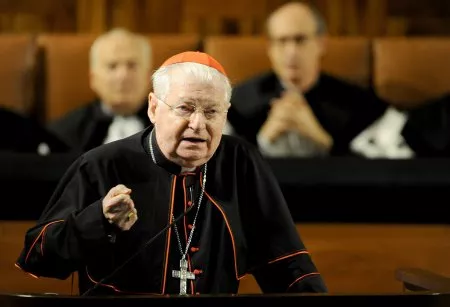
At 8:1, Cardinal Angelo Scola, 82, is a long-standing papal contender. He was among the favorites in the 2013 conclave that ultimately elected Pope Francis. Scola, a former Archbishop of Milan, has deep theological roots and appeals to those who support a more centralized and hierarchical Church.
His traditionalist stance makes him a strong candidate for those looking to pivot away from Francis's reforms, but his age may work against him.
1K notes
·
View notes
Text
A lot of people joke about how everything is falling apart because they're firing everyone who's too woke but like, that is a serious problem.
The reason that Diversity, Equity, and Inclusion is important isn't just a matter of economic justice. It's that members of privileged groups tend towards orthodoxy and orthodoxy tends towards "whatever you say, boss."
Of course, bosses hate when people say anything else but it's manifestly important that you allow for dissent in a large organization because that's how you avoid shit like everything falling apart because you decided to eliminate QC on your assembly line to save $4 per car.
The DEI Purges are straight up a management power grab welded to some culture war bullshit because that's the easiest way to sell it.
92 notes
·
View notes
Text
What do I mean by saying I'm non-denominational: I simply choose to not belong to any denomination (by keeping 1 Corinthians 1:10-13).
What do most of non-denominationals out there mean: We are Protestants but we don't want to admit we are Protestants. We hate Tradition, Mary was just a simple woman, Holy Communion is symbolic and icons are a sign of idolatry. We welcome everyone but Catholics and Orthodox are not Christians so they are not welcomed unless they become Protestants Christians.
(I'm so sick of this attitude that I now hesitate to say I'm non-denominational.)
Non-denominational Church
What people think it means: We're vaguely Protestant but not really associated with any particular group. That sounds so dogmatic.
What it actually means: We're so dogmatic and fundamentalist that none of the denominations would let us in.
#christianity#non denominational christianity#Protestantism#catholicism#orthodoxy#Just be honest with yourselves#“Non denominational” has become just one more buzzword that has lost its meaning. Just like “equality” “diversity” “inclusion” etc
202 notes
·
View notes
Text
Martin Pengelly at The Guardian:
The director of Project 2025, a rightwing plan to dismantle the federal government which Democrats warned about last year and forced Donald Trump to attempt to disown it, said Trump’s actions in power were proving “way beyond my wildest dreams”. Paul Dans was director of Project 2025 for the Heritage Foundation, the hard-right group which has produced such policy plans for more than 40 years. Project 2025 alarmed progressives with its advocacy of slashing government staffing and budgets and attacking protections for LGBTQ+ Americans; efforts to ensure diversity, equity and inclusion throughout government; attempts to tackle the climate crisis; and more. Democratic attacks proved effective enough for Trump to claim he had “nothing to do” with the project. In July, as the Trump campaign scrambled to limit damage, Dans was forced out of his Heritage role. Now, with Trump back in power, the president and his chief donor and ally, the Tesla and SpaceX billionaire Elon Musk, have mounted an assault on the federal government that has already led to thousands of firings, a bonfire of climate regulations, attacks on DEI initiatives real and imagined and much more. “It’s actually way beyond my wildest dreams,” Dans told Politico. “It’s not going to be the easiest road to hoe going forward. The deep state is going to get its breath back here, but the way that they’ve been able to move and kind of upset the orthodoxy, and at the same time really capture the imagination of the people, I think portends a great four years.” According to rightwing activists, the “deep state” is a permanent government of bureaucrats and operatives that exists to thwart Trump. Steve Bannon, a close ally to Trump and a chief propagator of the deep state conspiracy theory, has said it is for “nut cases”. Dans, who now works as a lawyer and government relations consultant, batted away questions about recent criticism of Project 2025 by Chris LaCivita, co-chair of Trump’s campaign and previously a target for Dans’s own complaints. But Dans also told Politico he was “not saying” Trump’s agenda and Project 2025 were “one and the same. I’m saying that directionally, they have a lot in common, but so do great minds.
“We had hoped, those of us who worked putting together Project 2025, that the next conservative president would seize the day, but Trump is seizing every minute of every hour. I’m not sure that you’d be able to implement Project 2025 without Donald Trump’s ability to bring people together and Elon Musk’s ability to focus the direction of the work.” Musk’s role overseeing the so-called “department of government efficiency” (Doge) has stoked controversy, not least over accusations that his businesses stand to gain from his efforts. He denies conflicts of interest. Dans said Trump “absolutely told the truth” when he distanced himself from Project 2025, claiming it was generated “outside of President Trump. It was done by the conservative movement to really say, ‘This is what we believe in. This is what we want to see in the next conservative president.’”
Paul Dans, the former chief of Project 2025, told Politico that Trump’s policy actions are “actually way beyond my wildest dreams” in the way that 47 has enacted a majority of P2025’s goals so far.
See Also:
Ahmed Baba: Project 2025's Chief Architect Says Trump Is Executing The Plan Beyond His "Wildest Dreams"
#Project 2025#Paul Dans#Donald Trump#The Heritage Foundation#Trump Administration II#Chris LaCivita#Politico
31 notes
·
View notes
Text
This was the week in which the Chinese made incredible gains in artificial intelligence and the Americans made incredible gains in human stupidity. I’m sorry, but I look at the Trump administration’s behavior over the last week and the only word that accurately describes it is: stupid.
I am not saying the members of the Trump administration are not intelligent. We all know high-I.Q. people who behave in a way that’s as dumb as rocks. I don’t believe that there are stupid people, just stupid behaviors. As the Italian historian Carlo Cipolla once put it, “The probability that a certain person be stupid is independent of any other characteristic of that person.”
And I am certainly not saying Donald Trump’s supporters are less intelligent than others. I’ve learned over the years that many upscale Democrats detest intellectual diversity. When they have power over a system — whether it’s academia, the mainstream media, the nonprofits or the Civil Service — they tend to impose a stifling orthodoxy that makes everybody within it duller, more conformist and insular. If Republicans want to upend that, I say: Go for it.
I define stupidity as behaving in a way that ignores the question: What would happen next? If somebody comes up to you and says, “I think I’m going to take a hike in a lightning storm with a copper antenna on my head,” stupidity replies, “That sounds like a really great idea!” Stupidity is the tendency to take actions that hurt you and the people around you.
The administration produced volleys of stupidity this week. It renewed threats to impose ruinous tariffs on Canada and Mexico that would drive up inflation in America. It attempted a broad and general purge of the federal work force, apparently without asking how that purge would affect government operations. But I’d like to focus on one other episode: the attempt to freeze federal spending on assistance programs, and Trump’s subsequent decision to reverse course and undo the freeze.
When announcing the freeze, the administration stated its clear goal — to defund things like the diversity, equity and inclusion programs that Trump disapproves of. A prudent administration would have picked the programs it opposed and focused on cutting those, through a well-established process known as rescission authority. But the Trump administration decided to impose a vague, half-baked freeze on what it claimed amounted to more than $3 trillion in federal spending. Suddenly, patients in cancer trials at the National Institutes of Health didn’t know if they could continue their treatments, Head Start administrators didn’t know if they could draw federal funds, cities and states across America didn’t know if they would have money for police forces, schools, nutrition programs, highway repair and other basic services.
This Trump policy was like trying to cure acne with decapitation. Nobody seems to have asked the question: If we freeze all grant spending, what will happen next? Once the ramifications of that stupidity became obvious, Trump reversed course. And this is my big prediction for this administration: It will churn out a steady stream of stupid policies, and when the consequences of those policies begin to hit Trump’s approval rating, he will flip-flop, diminish or abandon those policies. He loves popularity more than any idea.
But it is still true that we’re going to have to learn a lot about stupidity over the next four years. I’ve distilled what I’ve learned so far into six main principles:
Principle 1: Ideology produces disagreement, but stupidity produces befuddlement. This week, people in institutions across America spent a couple of days trying to figure out what the hell was going on. This is what happens when a government freezes roughly $3 trillion in spending with a two-page memo that reads like it was written by an intern. When stupidity is in control, the literature professor Patrick Moreau argues, words become unscrewed “from their relation to reality.”
Principle 2: Stupidity often inheres in organizations, not individuals. When you create an organization in which one man has all the power and everybody else has to flatter his preconceptions, then stupidity will surely result. As the German theologian Dietrich Bonhoeffer put it: “This is virtually a sociological-psychological law. The power of the one needs the stupidity of the other.”
Principle 3: People who behave stupidly are more dangerous than people who behave maliciously. Evil people at least have some accurate sense of their own self-interest, which might restrain them. Stupidity dares greatly! Stupidity already has all the answers!
Principle 4: People who behave stupidly are unaware of the stupidity of their actions. You may have heard of the Dunning-Kruger effect, which is that incompetent people don’t have the skills to recognize their own incompetence. Let’s introduce the Hegseth-Gabbard corollary: The Trump administration is attempting to remove civil servants who may or may not be progressive but who have tremendous knowledge in their field of expertise and hire MAGA loyalists who often lack domain knowledge or expertise. The results may not be what the MAGA folks hoped for.
Principle 5: Stupidity is nearly impossible to oppose. Bonhoeffer notes, “Against stupidity we are defenseless.” Because stupid actions do not make sense, they invariably come as a surprise. Reasonable arguments fall on deaf ears. Counter-evidence is brushed aside. Facts are deemed irrelevant. Bonhoeffer continues, “In all this the stupid person, in contrast to the malicious one, is utterly self-satisfied and, being easily irritated, becomes dangerous by going on the attack.”
Principle 6: The opposite of stupidity is not intelligence, it’s rationality. The psychologist Keith Stanovich defines rationality as the capacity to make decisions that help people achieve their objectives. People in the grip of the populist mind-set tend to be contemptuous of experience, prudence and expertise, helpful components of rationality. It turns out that this can make some populists willing to believe anything — conspiracy theories, folk tales and internet legends; that vaccines are harmful to children. They don’t live within a structured body of thought but within a rave party chaos of prejudices.
As time has gone by, I’ve developed more and more sympathy for the goals the populists are trying to achieve. America’s leadership class has spent the last few generations excluding, ignoring, rejecting and insulting a large swath of this country. It’s terrible to be assaulted in this way. It’s worse when you finally seize power and start assaulting yourself — and everyone around you. In fact, it’s stupid.
16 notes
·
View notes
Text
Alien Clay
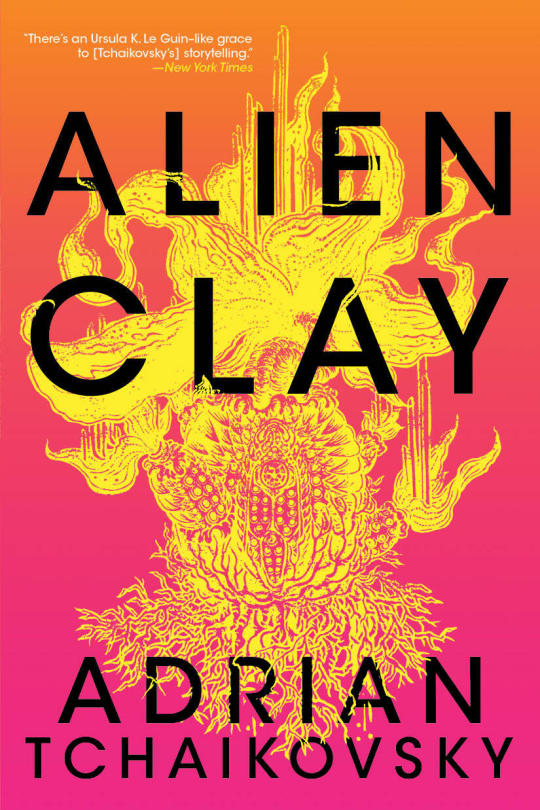
Alien Clay by Adrian Tchaikovsky
WOW WOW WOW. WOW. it's been a while since i've encountered a book as surprising as this one. not in a one-big-shock kind of way, but rather a pleasant slow creep of "are we really going there? oh my god, we are." key features of my delight include absolutely perfect use of "unreliable" limited first person narration, and expertly wielded sections of non-chronological narrative.
i've realized that i tend to approach these casual reviews more like a reading journal and i usually don't give any plot synopsis, which is related to how i like to approach books—with enough sense of the vibe to know i might like it, but not much foreknowledge of what it's about. but i've been feeling like maybe it would be useful to other people to have a tiny bit of synopsis, as a treat. so:
the plot of this book in one sentence: a xenobiologist and academic political dissident is sentenced to a labor camp on an alien world, where he is sure to die, but he might get to study alien life forms first.
it's a fascinating read, and feels very prescient right now. the way Tchaikovsky presents the political orthodoxy of this future, and the strengths and weak points of resistance from a perspective inside it, is so striking! and it's all happening inside this quiet growing horror, the source of which slowly shifts and evolves over the course of the book. what a treat to read a novel so fully unified in its themes, on every level of the narrative and even in the structure!
i also have to yell a little about the narrator, Arton Daghdev. he is simultaneously charming and pathetic, wickedly sharp and foolishly soft. his observations and assessments of himself and the people around him, of academia, of oppression and the oppressors, of the alien surroundings, are all so delightful to me and remind me favorably and unfavorably of many academics i know.
a complete stunner of a book, and my takeaway is that i should have been reading Tchaikovsky's books before now, and i will definitely be requesting some from my library.
the deets
how i read it: another e-galley from NetGalley! so close to digging out from the fall backlog i got stuck in!
try this if you: revel in ambiguous morality, have ever experienced academia, dig stories about resisting fascism, love to see a classic alien planet scenario turned on its head, or were into Scavengers Reign.
some lines i really liked: not kidding, i took 17 screencaps of possible inclusions for this section and whittled it down to a few examples of Tchaikovsky's funny and startling prose and incredibly sharp arguments.
Then we start grappling, slinging ourselves back and forth as the rest of the Labour jeer and cheer. He tries to ram a knee right into my academic credentials and I try to yank a fistful of that wiry beard out.
---
Primatt doesn't even look at me. If I'm a personnel file, it's one she hasn't opened. She makes her face into standard-expression-when-confronted-with-authority number seventeen: willingness to be enlightened.
---
And on such hills I die. That doubtless sounds stupid, to you who tell yourself you will take up arms when they starve your children, when they rob you of your goods, when they come for that demographic which includes you. But it's deviation from the truth that lets them do these things. It's the lies, at all levels, which mean when they come for you and yours, the others won't lift a finger, because they've believed the lies spread about you. It is the lies that starve your children because you believe the stories about general shortages, even though the grandees of the Mandate feast off gold plates every day of the year. And it is lies about science which cut most deeply, telling you that this or that group of people are naturally inferior, or another group has an innate ability to lead. That there is sufficient genetic distinction to make the call, when in actuality we share the vast bulk of our inheritance with mushrooms. Or else that, because of this kinship with mushrooms, our leaders are justified in keeping us in the dirt and feeding us shit.
---
He smiles thinly. I never saw so thin a smile. You could open your wrists with it.
---
"This could have been your crowning achievement," he tells me. "To contribute to solving the mystery. Instead of which you make it all about politics." Thus sayeth the politician when the scientist ventures an opinion.
pub date: September 17, 2024. GO READ THIS, IM NOT KIDDING AROUND HERE.
#books and reading#booklr#bookblr#book recs#book reviews#science fiction#adrian tchaikovsky#alien clay
14 notes
·
View notes
Text
How Progress Created A Monster
I asked ChatGPT, how to heal the USA. This is what they said:
How Too Much Progress Led to the Great Undoing: The Rise of Donald Trump and the Call for Balanced Leadership
In the last two decades, America has seen extraordinary progress—but also deepening division. For every leap forward in civil rights, technology, and cultural inclusion, there has been an equal and opposite reaction: resistance, fear, and a longing for what once was. We are living in a time where the idea of progress—once nearly universally celebrated—now polarizes.
The United States is caught in a violent pendulum swing between extremes. As one side gains ground, the other grows louder, more desperate, and more determined to claw back its place in the national story. This escalating cycle is what I call The Great Undoing—a slow unraveling of unity, where each gain feels like a loss to someone else, and no one feels heard unless their side is winning.
The rise (and return) of Donald Trump is not just a political event—it is a symptom. A symptom of a deeper crisis: the loss of balance, the erosion of empathy, and the growing belief that only one side can shape America’s future.
⸻
A Nation of the Disoriented
Many white, Christian, working-class Americans—the longtime cultural majority—are now grappling with a country that feels foreign to them. They’ve watched societal norms shift almost overnight. Values they were raised on are now labeled outdated, offensive, or oppressive. Traditions they once considered sacred are now questioned, critiqued, or discarded.
For some, this feels like progress. For others, it feels like erasure.
We cannot ignore the discomfort this causes—not to excuse prejudice or halt progress, but to understand the emotional terrain of this political moment. When a group that once held the cultural narrative feels sidelined, it doesn’t disappear. It reacts. And often, it reacts by seeking someone who promises to protect what feels lost.
Donald Trump’s appeal was never just about policy. It was about identity. He spoke to the silenced, the scolded, and the shamed. For many of his supporters, he didn’t need to be morally clean—he just needed to fight the forces they felt were erasing them.
⸻
Whiplash from Progress: The LGBTQ+ Movement, DEI, and Cultural Acceleration
The LGBTQ+ rights movement is a triumph of visibility and inclusion—but also a case study in cultural acceleration. Same-sex marriage went from a taboo to a constitutional right in under two decades. Gender identity discussions entered classrooms, corporate boardrooms, and political debates almost overnight.
Alongside this came the rise of DEI—Diversity, Equity, and Inclusion initiatives—meant to address centuries of systemic exclusion and bring historically marginalized voices to the center. In theory, DEI is about fairness. But in practice, especially in corporate and academic settings, it has sometimes been implemented with a heavy hand, fostering perceptions of forced conformity and ideological rigidity.
To many conservatives—and even some moderates—DEI represents a new orthodoxy, one that replaces merit with identity, treats dissent as hate, and redefines fairness in a way that feels arbitrary. The backlash has been swift. Critics call it “woke ideology,” accusing it of prioritizing feelings over facts, equity over excellence, and social engineering over freedom.
But the real issue isn’t the ideals behind DEI—it’s the speed, the dogma, and the lack of dialogue. When progress comes with shame instead of explanation, when people are expected to agree rather than understand, backlash is inevitable.
Again, this isn’t a condemnation of progress—it’s a warning about pace. Societal change without emotional onboarding breeds resistance, not harmony.
⸻
Immigration and the Anxiety of Displacement
Immigration is central to America’s story. But over the past 30 years, waves of migration—legal and illegal—have reshaped the demographic and cultural face of entire communities. For many Americans, especially in rural or working-class areas, this hasn’t always felt like diversity. It’s felt like replacement.
They worry their language, holidays, jobs, and ways of life are being crowded out. They see signs in languages they don’t understand, schools adapting to cultural differences they don’t share, and leaders calling for open borders while citizens struggle with housing, crime, and inflation.
This is where Trump’s “Build the Wall” rhetoric resonated—not just as a literal policy, but as a metaphor for boundaries, safety, and identity. That fear—real or imagined—has power. And when people believe their government is listening more to outsiders than to them, they vote for someone who promises to flip the script.
⸻
Conservative Economics: Control, Autonomy, and Mistrust of Government
Cultural issues may dominate headlines, but for many conservatives, the tipping point has been economic control and government overreach. From the Affordable Care Act to COVID-19 lockdowns, many felt their freedoms were being taken in the name of safety or equity.
They watched the government shut down businesses, mandate vaccines, and spend trillions of dollars—all while inflation soared and national debt climbed. To those who believe in small government, personal responsibility, and local control, this wasn’t just bad policy—it was an existential threat.
This economic frustration is not separate from the cultural one. It’s part of the same feeling: that someone else—far away, unaccountable, and out of touch—is making the rules for how Americans live.
⸻
Historical Echoes: When the Pendulum Breaks Things
American history is full of cycles: progress followed by backlash, openness followed by retreat. The 1920s brought liberation—and then the Great Depression. The 1960s gave us civil rights—and then the conservative swing of the Reagan era. The Obama presidency promised change—and Trump answered with disruption.
This is not new. But what is new is the intensity of the divide, amplified by social media, tribal news, and digital silos. The pendulum isn’t just swinging—it’s smashing everything in its path.
The real danger isn’t one side winning. It’s the inability to stop the swing long enough to build anything lasting.
⸻
A Moderate Path—Or No Path at All?
Here lies the challenge: both sides now expect total victory. The left expects continued progress on every social front—racial justice, gender identity, climate policy. The right expects the restoration of what they believe has been stolen—culture, values, faith, control.
This is the tragedy of our time. Each side believes it is defending something sacred. Each believes the other is trying to destroy the country.
And so we swing. From Obama to Trump. From Biden to… perhaps Trump again. Each administration isn’t just governing—it’s undoing the last. There is no sustained vision. Only revenge.
A moderate party or president could be the answer—a figure who acknowledges inequality but also understands cultural trauma. Someone who respects both faith and freedom, both tradition and change. But the country may not be ready. Because moderation requires trust, and trust is in short supply.
⸻
Conclusion: Progress With Empathy—or Collapse With Pride
We are a nation of contradictions. A melting pot that’s struggling to stay whole. A democracy that no longer agrees on truth.
Progress is necessary. But progress without empathy becomes tyranny. And backlash without reflection becomes cruelty.
If we want a future where we aren’t just taking turns silencing each other, we need to pause, breathe, and listen. We need to remember that our neighbors are not our enemies—and that the real enemy is extremism, from any side.
4 notes
·
View notes
Note
Hi sorry I didn't mean for the tone to come off that weird and I was on mobile. I took for granted that lesbianchemicalplant is pretty well known to be Like That and should have provided proof. One of the reasons that you can search spacelazarwolf and not get too much is because she mostly uses screenshots and also tumblr's search feature is garbage.
Anyway, she frequently is weird about trans men and calls any talking about their experiences Privileged and transandrophobia truthers
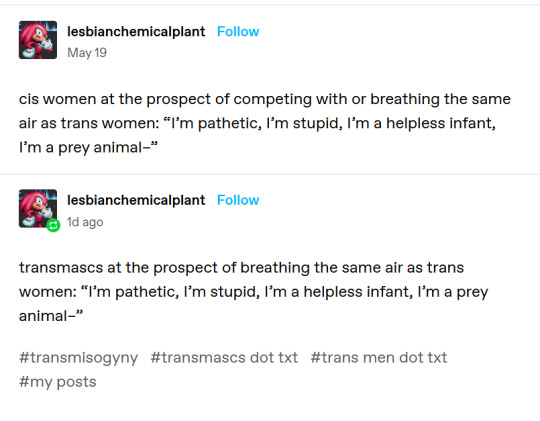

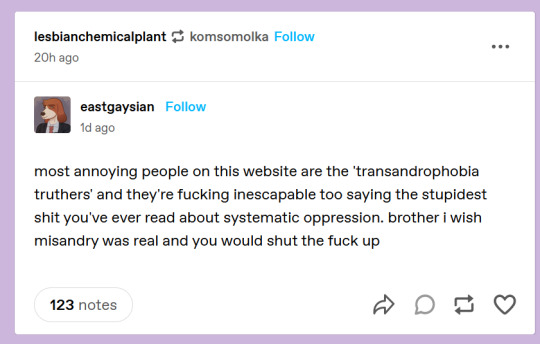
And then is also weird about Jews. Like all the time. Any time any jew talks about their experience she claims they are a zionist
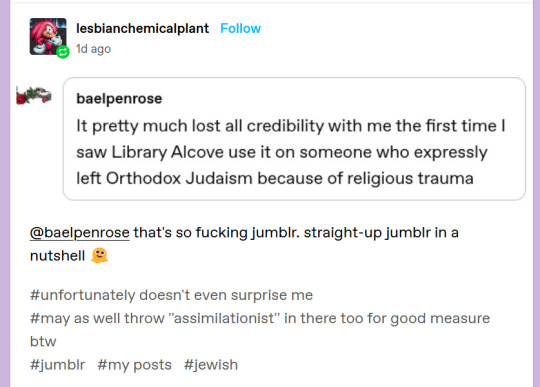

hey! it's all good, and thanks for not being afraid to come off anon. I don't wanna be hostile to people but it's easy to read anons as being in poor faith for.. obvious reasons lmao, average tumblr experience
anyway I do agree this shit abt transmascs is vile. it's very funny that she has baeddels in her dni but is basically regurgitating their shit.
as for the jewish stuff, I still have to reiterate that she herself is jewish according to her about, and I feel like she has the right to cricitize her own community especially wrt orthodoxy & trauma. to be honest, these screenshots still feel real cherry-picked and don't have much context behind them. most of the claims of zionism I'm seeing on her blog are pretty well-founded, especially when a few of these people overtly call themselves zionists. the exception is when she uses fanpol to justify accusations of bigotry, which I think is generally a stupid stance anyway
I don't really use this website for discourse or news LMAO this is the website where I talk about being a faggot and look at images and sometimes reblog opinionated posts. I rb'd the post we're talking about because to me it spoke to a broader issue wherein tumblr's attempts at acceptance/inclusion become infantilizing and erase problems within already-marginalized communities... Treating a community like it is Inherently Progressive is clearly better than antisemitism but it's still bad, you know?
overall I am far from a fan of OP and I don't 100% agree with everything she says or believes, but I don't necessarily think that I have to. I might delete the post because, while I am learning, I am not myself Jewish & don't wish to overstep. but I don't think she was being weird about jewish people, I think she just cares about zionism and doesn't like jumblr being full of libs lol
#mad scrawl#is there a word for this. I feel like there's a word for this#not quite infantilization. not really white-washing.#turning off rbs because people are going to be annoying and insane in my notes and I just am not into that
80 notes
·
View notes
Text
Being queer and a Christian is often very difficult. I experience alienation from both sides. Often these two parts of myself feel impossible to reconcile. But, I want to share something beautiful that my priest does that nearly makes me weep every time. The Orthodox Church is not known for its inclusivity or progressiveness. It is ancient and its gears turn slowly. During Holy Communion, those who are not confirmed members of the Church may come forward for a blessing. The blessing is done by gender.
"The servant of God [Name] is blessed..." for men,
"The handmaid of God [Name] is blessed..." for women.
The first time I went up for a blessing, I was hesitant. My gender is no secret and I do not try to hide my queerness. Which blessing would I receive? With sadness, I concluded the priest would do what was simplest and default to my assigned gender.
I stood before him and bowed my head, arms crossed over my (noticeably growing) chest. He raised the golden chalice over my head and lovingly said:
"The beloved of God Quinn is blessed, in the name of the Father, and of the Son, and of the Holy Spirit, Amen "
He has done this ever since and with this simple action, preaches one of the main, if oft forgotten pillars of Orthodoxy: It does not matter who you are, what pronouns you use, what colour your hair is, what clothes you wear, what mistakes you've made, what trials you have overcome, where you came from or where you are. You are beloved of God just as you are. You are created in the Image of God and are a sacred vessel of beauty, and there is a place for you here.
This is true inclusivity. Not the white liberal veneer placed on so many churches where the cishet, boomer congregation pats themselves on the back for the rainbow flag outside while actively misgendering the trans person sitting in the pew. My priest has not given any big speeches talking about how everyone is loved here. He doesn't have to. His genuine kindness and that of my fellow parishioners are the only sermon marginalised people need to hear. In these moments, the two parts of myself become one and I truly believe that the God I love delights in me.
#queer christian#orthodox christianity#orthodoxleftist#faithfullylgbtq#orthodoxy#trans christian#orthodox church#inclusiveorthodoxy#thisglassdarkly
391 notes
·
View notes
Text

By: Stephen Knight
Published: May 29, 2024
Comedy is becoming increasingly humourless and ideologically captured. So it should come as no surprise that the small number of comedians willing to make jokes about the ridiculous nature of trans ideology have become targets of fierce criticism. However, there is something especially pathetic about efforts to police what is acceptable in comedy when it is other comedians doing the policing. It’s like an ambulance being involved in a hit-and-run. It’s just worse.
Two particularly bad offenders are comedians Joe Lycett and Nish Kumar. Both have recently gone after Ricky Gervais, whose stand-up material pokes fun at trans activists. This week, Kumar took aim at Gervais on his podcast, Pod Save the UK, claiming that Gervais wants to ‘target and attack a vulnerable and marginalised community’. Similarly in February, Lycett appeared on The News Agents podcast, where he slammed Gervais for ‘doing material which is attacking trans people’ and ‘minorities’.
These attacks by Lycett and Kumar reveal that they either haven’t watched the material they say is so egregious – or worse, they didn’t understand it.
The routine that Lycett and Kumar are likely gesturing to is a bit from Gervais’s 2022 Netflix special, SuperNature. Far from attacking transgender people, the joke in question takes aim at the deranged disciples of trans ideology and gender self-identification.
The premise of the routine is that a trans activist becomes increasingly irate the more his belief that women can have penises is questioned. When a woman raises concerns about sharing the female toilets with a transwoman, asking ‘What if he rapes me?’, the trans activist becomes furious. ‘What if she rapes you, you fucking TERF whore!’, he screams.
The joke here is obviously that these gender zealots care more about a bloke with a penis being ‘misgendered’ than about the safety of a woman having to share loos with the penis-owning stranger. What Lycett and Kumar fail to understand from inside their ultra-progressive echo chambers is that this scenario isn’t just an invention of one comedian’s imagination. Any woman that has dared to defend their sex-based rights from the encroachment of gender ideology will be able to tell you about the rape and death threats and the risk of cancellation they face. Whenever they try to gather anywhere to protest for their rights, they are met with violent intimidation. In some cases, they have been visited by police.
Just this week, it was reported that the NHS is facing legal action after 26 female nurses complained about being forced to share the women’s changing room with a trans-identified male. One of the nurses in question, who was the victim of sexual abuse as a child, spoke of how ‘petrified’ she was to have this male in her space. Not least as the man repeatedly asked her when she planned on getting changed. The HR manager responded to these concerns by telling the female nurses they must ‘be more inclusive’, ‘broaden their mindset’ and ‘be educated and attend training’.
Worse still, in real life, the female victims of assault by trans-identifying men really have been compelled to recognise the ‘gender identity’ of their attackers. In 2018, a woman was required by a court of law to pretend her male attacker is actually a woman. In 2022, mainstream news outlets, including the BBC, edited the direct testimony of a rape survivor to avoid the unforgivable sin of ‘misgendering’ her rapist.
Just look at the ordeal Roz Adams has faced. Earlier this month, an employment tribunal concluded that she was unlawfully discriminated against and unfairly dismissed from her job at the Edinburgh Rape Crisis Centre. Why? Because she believed that the victims of rape – who often understandably find being in close proximity with men traumatic – had the right to know and choose the sex of the staff member providing them with care. The tribunal concluded that management’s treatment of Adams amounted to a ‘heresy hunt’.
Such ‘heresy hunts’ are the backdrop for Gervais’s jokes about trans ideology. And it is the suffocating new reality regular people now find themselves having to navigate on a daily basis. The average person no longer has to contend with the authoritarianism of the church. They are more likely to fall foul of the blasphemy codes and dogmas invented by the new gender puritans in our midst.
Lycett and Kumar want us to believe Gervais has devolved into a chauvinistic, reactionary shock jock. In reality, he has always gone after quasi-religious ideologies that are hostile to science and the right to free expression. The new church of gender ideology is no different. It compels people to believe that men can become women simply by saying so and demands that all who disagree are financially, reputationally and sometimes even legally punished. Surely this gives any conservative, science-denying, crackpot church a run for its money.
Taking aim at trans ideology isn’t a regression for Gervais. It’s a display of consistency. It is just that he is joking about a worldview that the Lycetts and Kumars of this world simply aren’t equipped to think about critically. They imagine themselves as moral guardians of what is permissible in modern comedy. Unfortunately for them, the speed with which Gervais continues to sell out tours and break streaming records tells us that audiences still have the final say of what goes and which jokes land. And it seems that they have had their fill of censorious, virtue-signalling ‘progressives’ who are too toothless to leave the safety net of their right-on establishment views.
Thank God for comedians like Ricky Gervais, who refuse to play it safe. Most of us want a laugh, not a lecture.
==
At bottom, this is a complaint about religious blasphemy by a heretic.
There's no human right to not being offended. And demanding that you (or one group) alone get to be immune from comedy is demanding special privileges. Equality means you get to be treated as fair game like everyone else.
#Stephen Knight#Ricky Gervais#gender activism#gender cult#comedy#blasphemy#heresy#gender ideology#gender identity ideology#religion is a mental illness
19 notes
·
View notes
Note
i won't lie as a (very relaxed) eastern orthodox christian it is constantly confusing / funny to see the word 'orthodox' b used in the context of christianity but not referring to the denomination itself... like i dont wanna make assumptions that the instagram acc u were talking about was american but the idea of american evangelical 'orthodoxy' just is very amusing to me. its like calling myself a methodist bc i love being methodical in my faith. like i recognise that is also a valid & used meaning of the word but it never fails to throw me off
Right! I also feel like the general public thinks of EO churches when they hear "orthodox" in relation to Christianity too. I only ever hear people say "inclusive orthodox" in niche mainline protestant / anglican circles lol. The instagram account very much was American lol, an inclusive Episcopalian church. Tbh I never hear the average american evangelical use the word orthodoxy either. They just say stuff like "we believe in the bible" or something like that lol.
3 notes
·
View notes
Text

@baronmagikcarp I didn't want to annoy the OP of that post so I'm replying by screenshotting/tagging lol
(Edit: ....this became an Info Dump)
Y'know, I still think of myself as something of a Noob at this whole "Christian" thing, but I think the problem is that my online religious discussion spaces have a lot of clergy/seminarians/Church Nerds in them.
Like I knew the names of those heresies off the top of my head--I opened the wikipedia pages just to double-check I was spelling them right. What the actual fuck.
That said, I'm incapable of thinking about Trinitarian heresies without hearing a leprechaun in my head yelling, "That's modalism, Patrick!"
(Modalism is also called Sabellianism)
youtube
In any case, as the joke goes, if you think you understand the Trinity, you're probably doing a heresy, and the heresy was defined and named before, like, 1000 CE; the point of the Trinity is that it's a mystery and we can't really understand it.
(This is the Trinity. Obviously. /half joking)
Wikipedia's list of Trinitarian heresies is based on the definitions put forth by the Roman Catholic church, but since most of them were decided before the Great Schism (much less the Reformation), plenty of non-RC churches define them as heresies as well, including all the Anglican churches.
To the degree that the Episcopal church has a set of normative beliefs* (none of which are required of anyone except, theoretically, ordained clergy**), the list is here, but if you dig into the site's glossary you can find a lot of the major heresies listed by their names and defined as heresies.
(*"What do you mean you don't have a set of beliefs" We're not a confessional denomination, we're united by liturgy more than anything else hence the Book of Common Prayer, I talked about it a bit here; something something lex orandi, lex credendi; something something orthopraxy; something something via media; ask a handful of Episcopalians whether the bread and wine at the Eucharist are Jesus' body and blood and most of them will answer something about the Real Presence, but ask us to define that and most of us will smile and say it's a Mystery, and a few people will smile and then say something like "Well I believe in consubstantiation as opposed to transubstantiation but it's not like our salvation depends on those details." Like, we have a catechism in the back of the BCP but I wasn't required to read it or agree with it to be confirmed; I read the book Walk in Love instead which is often used in Episcopal confirmation classes, because it includes things like church polity; but I did say to my bishop, in front of my church and family, that I believed a few things during my confirmation, mostly based on the Apostle's creed.)
(**This is what I get for hanging out online with Church Nerds; a lot of the younger ones who self-define as "inclusively orthodox" have extremely strong negative opinions on priests and bishops who openly doubt, for instance, the physical resurrection or the virgin birth. I have mixed feelings on this--doubt is considered normal and fine in the Episcopal church. But I do feel odd about clergy preaching that "eh maybe those things didn't happen," because I do feel like faith should sort of be the goal?? But then it also seems arbitrary to believe the Gospel stories are literal when we don't insist on literalism/inerrancy in any of the rest of the Bible. Can you tell I've thought about this a lot. Anyway don't get me started on the "inclusive orthodoxy" movement or I'll be here all fucking day--the tl;dr is that I mostly agree with them but they can be smug dicks about it and it puts me off.)
#me: I don't know anything about my own religion I'm a dumbass#also me: *looks at this post* what the actual fuck#I swear to Jesus Himself I learned like 80% of this on the Episcopal subreddit. that glossary. twitter conversations. and wikipedia#Youtube
5 notes
·
View notes
Text
A Selection of Mistmas Carols
Ten years ago, I did a Survivorist Christmas cover, and in honor of that anniversary... I decided to make some more! This time we've branched out to some of the other Scadrian faiths too, but I had a lot of fun with these. I hope people enjoy them! Each song has a little lore blurb to go along with it too.
The art backgrounds on these are by @conjchamberlain who created them for our Diceborn series, but was kind enough to let me reuse them for this project too.
youtube
Though the inclusion of lyrics in High Imperial evokes an antiquated air, this Survivorist hymn celebrating the life of the Ascendant Warrior is in fact, quite contemporary. Written by notable composer Doxell Venture to commemorate the deeds of his house’s most notable member, this piece was first performed in the Elendel Cathedral in 293 PC. While it is unique among Survivorist hymnary for lacking direct mention of the deeds of the Survivor himself, it remains one of the most popular holiday carols throughout the Basin.
- Historical and Religious Arts Archive, Elendel University
youtube
Like many works affiliated with the Pathian faith, neither composer and lyricist of this short hymn are known. The absence of hierarchy or formal clergy of the Path make sourcing historical works like this remarkably difficult, despite its status as the most well known song of the Path in popular awareness.
- Historical and Religious Arts Archive, Elendel University
youtube
One of the oldest extant anteverdant songs, this hymn is believed to have been commissioned by the Canton of Orthodoxy in the late 600s of the Final Empire. Its stark lyrics both capture and celebrate the brutal inequality of life before the Catacendre. An additional stanza is notated here which describes a day in which the Lord Ruler will return. Apocryphal testimony sources this final verse to modern day Sliverist cults, but such claims have never been substantiated.
- Historical and Religious Arts Archive, Elendel University
youtube
A well documented historical record supports the claim that this hymn describing the fall of the Final Empire as the earliest written work in the Survivorist faith. Its lyrics are believed to have originally been written by an unnamed poet during the turbulent days of the Catacendre itself, but later became the song we know today when it was set to music in the first century PC.
- Historical and Religious Arts Archive, Elendel University
#cosmere#brandon sanderson#mistborn#cfsbf#cosmere filk#my voice#these were a lot of fun to do and i'm quite pleased with how they turned out!#maybe i shouldn't have put them all in one post but WHATEVER im too lazy to break them up#Youtube
19 notes
·
View notes
Text
there can be a tendency to stereotype a notion of 'orthodoxy' as rigid thought-policing informed by political maneuvering - and i don't deny that is a relevant element - but i was thinking recently abt the ways in which 'orthodoxy' can function also as a safeguard, in a way.
if one of my friends invites me to a church that preaches there's a fourth member of the trinity called Joe or that there's a Third Testament, that immediately acts as a red flag. that's not bc there's anything inherently about weird beliefs that causes people to be abusive, or that professing the nicene creed protects churches from being shitty (far be from it).
but i think a dive into heresy often signals a certain self-centredness, a cutting off from others. "Unlike every other Christian church, we have the truth about the Bible suppressed for so long" quickly becomes "We are the only way to God and you need to stick with us or be damned."
Whereas a willingness to commit to a shared orthodox belief can't help but be more inclusive. If you're Lutheran you have to admit at least other Lutheran churches, if not most Protestant ones, are also entirely valid places to worship God. You have less grounds to convince people the one Lutheran church you pastor is the only gateway to heaven.
And granted, there are forms of non-orthodox belief which avoid this problem entirely, bc their deviation from the norm is a softening of more exclusivist aspects, not an intensifying (e.g. theological liberalism). But certainly in a lot of cases, non-orthodox beliefs are a red flag bc they indicate 'we don't want to play with others'
12 notes
·
View notes